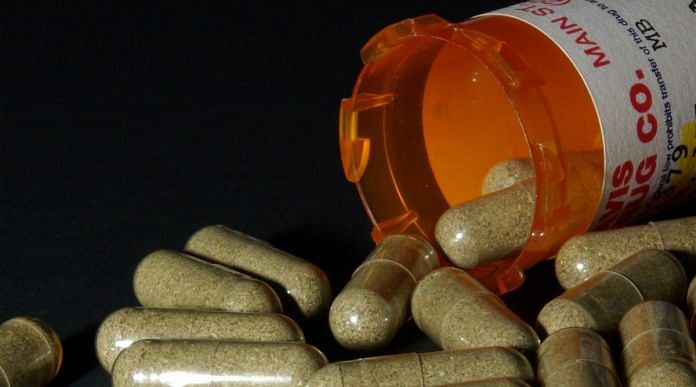New Delhi: At the end of April, a patient approached Dr Ashwani Goyal, a general practitioner from Delhi, gasping for breath. The patient had all the obvious symptoms of Covid-19 and ultimately succumbed to the illness. Seeking medical attention earlier could have saved his life, but he only arrived at Dr Goyal’s door when his condition had become critical. It’s a trend Goyal has observed often during the Covid-19 pandemic.
“He took a family member’s prescription, which was written by a pulmonologist, and started on those drugs straightaway instead of consulting the doctor first. By the time he came to me, his oxygen was at 72 and I had to refer him elsewhere. I later learned he died,” Dr Goyal told ThePrint. “This isn’t a stray case, there are countless such cases,” he added.
Among the medications the patient had started, Goyal said, was the antiparasitic ivermectin, besides the antibiotics doxycycline and azithromycin.
In the revised guidelines issued on 27 May by the Directorate General of Health Services (DGHS), which comes under the Union Ministry of Health and Family Welfare, the mention of these drugs had been removed, as was that of hydroxychloroquine, zinc and vitamins, even though the latest rules outlined on the health ministry (updated 24 May) and the Indian Council of Medical Research (3 May) websites suggest otherwise.
As the second Covid wave took root in India and flooded hospitals, many patients took recourse to self-medication, something also reported during the first wave. Prescriptions were shared among acquaintances on WhatsApp, and people anxious about developing a severe Covid infection popped the pills, often without individual medical consultation.
Doctors say lax oversight at pharmacies fuelled the trend, and constant updates in government guidelines — which usually lay down when a drug can’t be administered without medical supervision — stoked confusion.
“The guidelines have changed quite frequently, and that has made it very confusing for both doctors and patients,” said Dr Goyal, adding, “With time, we may see changes in the way people self-medicate, but they are going to continue swapping prescriptions over WhatsApp and consult their friends. It happened before Covid too.”
Also read: ‘Fearing Covid’, Indians are popping ivermectin, HCQ, dexamethasone — all self-prescribed
Why patients self-medicate
As Dr Goyal noted, Indians have been associated with a proclivity for self-medication, whose adverse impacts include side-effects and drug resistance.
A 2020 meta analysis of 17 papers on self-medication in India found that the practice had a mean prevalence rate of 53.57 per cent, and that the most common reasons for self-medication included minor ailments and familiarity with the drugs. Another reason cited was “a lack of regulation on OTC (over-the-counter) drugs and non-adherence to the rational drug use practice and policies”.
Doctors say the pandemic has exacerbated these tendencies, aided by social media, changing guidelines on medications, a rise in health anxiety, and a bombardment of information on new drugs and treatments for Covid-19.
“Initially, it was hydroxychloroquine, then it became ivermectin and doxycycline, then azithromycin. Now it’s remdesivir and steroids,” said Dr Jugal Kishore, head of community medicine at Delhi’s Safdarjung Hospital.
“Pharmacies were giving these out to people in packs, sometimes mixing them with ayurvedic treatments like Coronil.”
Like Goyal, Dr Kishore says the government’s guidelines are for doctors and people to follow, but can’t be strictly enforced.
Dr Rajeev Jayadevan, an endocrinologist and former president of the Indian Medical Association, who has delivered several lectures on the irrational use of drugs through the pandemic, described the tendency of self-medication — and over-medication — as a vicious cycle.
“When patients approach doctors, they come with the expectation that they will ‘do something’ — prescribe medication, in other words. It’s not unusual for doctors to be asked why they aren’t prescribing certain drugs,” Dr Jayadevan said. “Both doctors and patients are comparing prescriptions with each other, and that’s led to an unhealthy, vicious cycle of sorts. The ready availability of the drugs at pharmacies and a lack of strict regulation has allowed this to happen.”
Role of mental health
Patients who are particularly anxious about their health may also consult online forums and chat rooms, apart from seeking online consultations.
“A patient will physically come to the hospital usually when they really have reason to. But with online consultations, doctors are a phone call away. I’m getting more and more calls for minor issues, and from people being overly cautious,” said Dr Sampath Chandra Prasad Rao, a skull surgeon with Manipal Hospitals in Karnataka.
“The very fact that people resort to online consultations, when they are superfluous, indicates that people are anxious about Covid and other diseases. I know many in my own circle who suffer from this anxiety.”
Doctors from the Government Institute of Medical Sciences (GIMS), Noida, found a strong link between health anxiety and the tendency to self-medicate. The study, conducted during the first wave of Covid-19 in 2020, involved an online survey. Of the 1,100 responses, one-fourth “of the responders reported self‑medication, out of which 60 per cent were found to be anxious”.
Of those self medicating, 56.6 per cent were doing so for the first time, the study noted. “The drugs were taken primarily for symptoms such as headache, pain in the abdomen, ghabrahat (anxiety), and inability to sleep,” the study added.
The most commonly used drugs were nonsteroidal anti-inflammatory drugs, such as aspirin and ibuprofen.
“We had done this study in the first wave, it must be much, much worse now,” Dr Bharti Bhandari, one of the co-authors of the study, told ThePrint.
Also read: Self-medication for Covid has turned disastrous. Families must not assume doctors’ role



